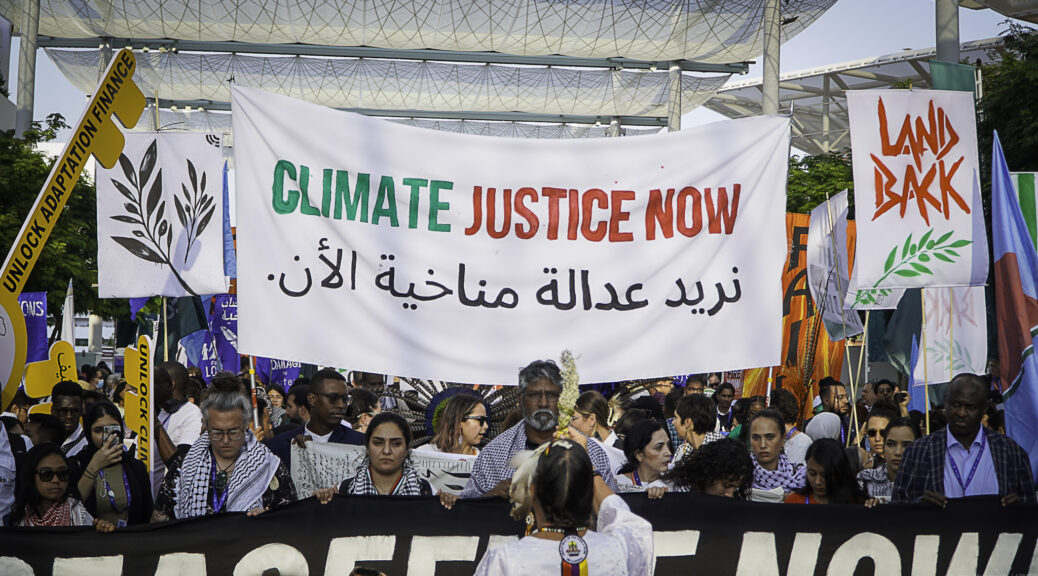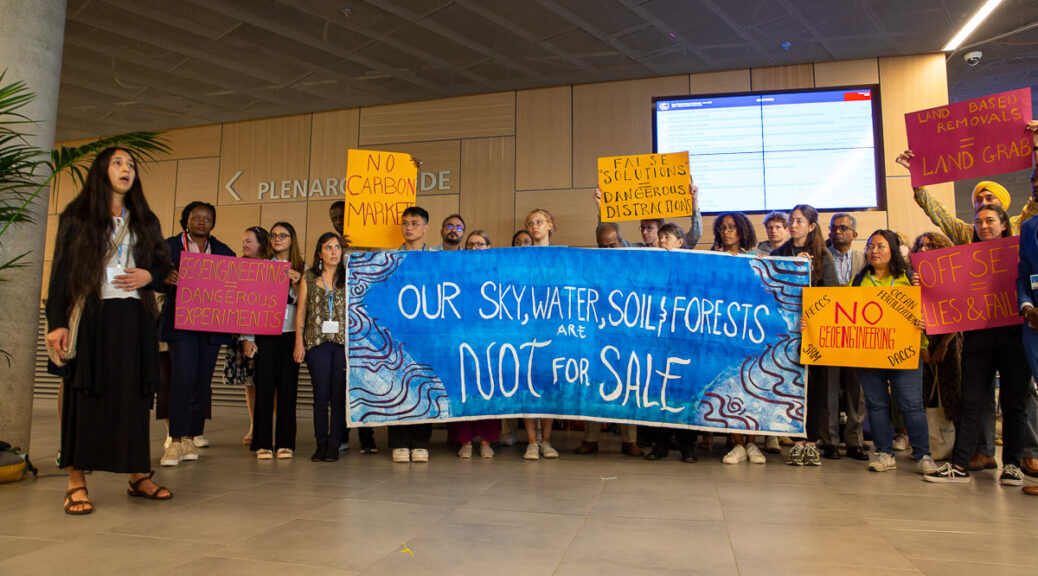As a global network of human rights and climate justice organisations, we stand in unwavering solidarity with the people of Palestine. We see the struggle of the Palestinian people against occupation and apartheid as part of our collective struggle for climate, racial, economic, gender, and political justice and for a world where everyone has the right to live with dignity, free from oppression. Our commitment to justice, equity, and the preservation of our planet drives us to speak out against the interconnected injustices that fuel both human rights abuses and environmental destruction. It is in this spirit that we condemn the actions of the German government in suppressing pro-Palestine events and its complicity in the ongoing violence against the people of Palestine and Gaza.
Recent events in Germany have highlighted a disturbing trend of silencing dissent and stifling the voices of those who stand in solidarity with the people of Palestine. German police recently cracked down on peaceful pro-Palestinian protestors, with numerous incidents of excessive force and arbitrary detentions reported during demonstrations across major cities like Berlin. We stand in solidarity with the activists who have been subjected to unwarranted surveillance, and organisations that support Palestinian rights who have faced increased scrutiny and restrictions.
We call out this suppression that extends to the academic sphere as well, with experts like Dr. Ghassan Abu Sitta, a British-Palestinian surgeon and witness to acts of war crimes by Israel in Gaza, being denied entry into Germany and other prominent figures like Yanis Varoufakis and Salman Abu Sitta simply for expressing solidarity with Palestine.
We condemn the German media and the political leaders for their racist and islamophobic rhetoric vilifying Palestine voices and supporters by attempting to brand anti-zionist narratives as anti-semetic.
By cracking down on peaceful protestors and banning experts, it is clear that the German government would rather align itself with oppressive regimes and contribute to the perpetuation of ongoing injustices in Gaza. This trend is not isolated to Germany; similar crackdowns on peaceful protests have been observed across the Global North, including the United States, where student protests on campuses in support of Palestine have also faced violent crackdown.
We also recall the hypocritical stance of Germany and the European Union lawmakers against Egypt, host of COP27 in 2022. As nations that talk about upholding fundamental human rights like the right to freedom of expression, and the right to assembly and association, the suppression of pro-Palestine activities and Palestinian voices in large parts of the Global North has laid bare the hegemony of the western world and exposed the truth of their “moral superiority”.
We call out Germany’s complicity in the ongoing conflict in Gaza that extends beyond the censorship of Palestinian voices. Between 2001 and 2020, Germany exported approximately $1.7 billion worth of military equipment to Israel. Its defence export approvals to Israel in 2023 rose nearly tenfold from the previous year and accounts for nearly 30% of arms supplied to Israel thus enabling the ongoing assault on Palestine and Gaza.
As of May 2024, the ongoing conflict in Gaza has resulted in over 36,000 Palestinian deaths, with the majority being women and children. More than 200 days of war has led to mass graves, crippled hospitals, thousands of civilian deaths and near total destruction of infrastructure in Gaza, including residential areas, schools, and universities. A child is killed or wounded every 10 mins in Gaza, more than 10,000 women have been killed, including 2 mothers killed every hour in Gaza, and 250 Palestinians are killed every day by Israel. Nearly 200 aid workers, more than 100 journalists and 493 healthcare workers have been killed in Gaza so far.
Right to health has been decimated in Gaza, as 84 per cent of all health facilities are damaged or destroyed and 62 percent of all homes have been destroyed in Gaza. Israel, supported by its western allies, including Germany, has consistently used starvation as a weapon of war, the devastating effects of which can be seen throughout Gaza as nearly 1.1 million people in Gaza are facing catastrophic levels of food insecurity.
It is inexcusable that Germany and its western allies continue to arm a state engaged in such acts of aggression and human rights violations against the people of Palestine. We hold Germany and its western allies accountable for their unwavering support for Israel, as the majority of the world supports the South Africa’s genocide case against Israel in ICJ as well as the ICC case where the ICC prosecutor recently requested arrest warrants for Israel’s prime minister and defence minister.
We condemn Germany and western world’s silence on these proceedings that allow Israel to continue its genocidal war and intimidation with impunity and shows total destruction of the global rules based system.
A recent report by Francesca Albanese, UN Special Rapporteur on the situation of human rights in the Palestinian territories occupied since 1967, states “Israel’s executive and military leadership and soldiers have intentionally distorted jus in bello principles, subverting their protective functions, in an attempt to legitimise genocidal violence against the Palestinian people”. We call on Germany, and the international community to uphold its moral and legal obligation to stop these attacks and support efforts that promote justice, accountability, and the protection of human rights for all.
We demand Germany and the western world to redirect resources expended on conflict and arms to address the pressing issue of climate change. In 2020, global military expenditure reached nearly $2 trillion. In addition to the direct financial cost, the carbon footprint of the world’s militaries is substantial at nearly 5.5% of the global emissions. The destruction caused by conflict leads to environmental degradation, loss of biodiversity, and the displacement of communities, all of which compound the challenges of climate change.
The financial priorities of major powers also reflect a troubling disparity between military aid and climate action. Since 2016, the US has been giving Israel a military aid of $3.3 billion every year, which means, from 2016-2023, the US has spent $26.4 billion of public finance as military aid to Israel, a country that has been responsible for the oppression and apartheid of more than 5 million Palestinian people, including displacement of more than 2 million people within Gaza. In 2022, the US did not meet its climate finance obligation based on its historical responsibility, yet continued the delivery of the $3.3 billion military aid to Israel. The struggle for human rights and the fight for climate justice are inextricably linked. Both are driven by the need to challenge systems of oppression and exploitation that prioritise profit and power over people and the planet. The colonial extractive systems that underpin the current climate crisis are the same systems that fuel conflict and human rights abuses.
We strongly reaffirm our solidarity with the people of Palestine and call on the global community to stand in unity with the oppressed. As we gather for the United Nations Climate Change Conference in Bonn from 3 June to 13 June 2024, we call on Germany and all our governments and international bodies to work together to end the war, and to bring all those responsible for war crimes to justice. We demand an end to the occupation and genocide of the Palestinian people and all those who are fighting for justice and dignity. We call on governments, corporations, and civil society to join us in challenging the systems of oppression and exploitation that threaten our planet and our future. There is no climate justice without human rights.
Our Demands
We call on the German government to:
- End Impunity: Stop support for Israel, including ending arms sales to Israel particularly in the context of human rights violations and stop all support and funding to Israel immediately. Political alliances should not take precedence over human lives.
- Support a Just Peace in Palestine: Advocate for a just and lasting resolution to the Israeli-Palestinian conflict that respects the rights and dignity of all individuals.
- Uphold Right to Free Speech and Assembly: Respect the rights to free speech and peaceful assembly of Palestinian voices including the global civil society by allowing events and protests to proceed without intimidation or harassment
- Redirect Military Spending to Climate Action: Reallocate military spending towards climate finance and to support peoples led solution to climate crisis
We also call on the international community to:
- Immediate Ceasefire: We echo the calls of the United Nations Secretary General and humanitarian and human rights organisations for an immediate ceasefire in Gaza
- End the illegal blockade: Urgent humanitarian and emergency aid must be provided to civilians in Gaza. The people of Gaza are in dire need of medical supplies, food, water, and other essential resources, which need to be restored urgently.
- Hold Israel Accountable: Ensure that Israel is held accountable for its genocidal war in Gaza and violations of international law and human rights, including its recent offensive in Rafah
- Stop Racism, Islamophobia and Anti-Semitism: We stand in solidarity with our comrades in the Jewish and Muslim communities who face bigotry. The struggle for climate justice is a struggle for racial justice.
- Promote Systemic Change: Challenge the colonial and extractive systems that drive both environmental destruction and human rights abuses.
Launching Organisations
Colectivo VientoSur, Chile
Asian Peoples’ Movement on Debt and Development
Third World Network
War on Want
Corporate Accountability
International
Aliança RECOs – Aliança em Redes de Comutiária desde o Sul Global
ANGRY – alliance of non-governmental radical youth
ASOCOLEMAD
Centre for Environment, Human Rights & Development Forum – CEHRDF
EDGE Funders Alliance
Equal Right
Food Justice Network
Global Forest Coalition
IBON International
International Rivers
JASS – Just Associates
Laboratorio Experimental do Som
Movimento Mulheres pela Paz na Palestina
Parable of Sower Intentional Community Cooperative
RIPESS
Society for International Development
The Rights Studio
Regional
THE CENTER OF INTERNATIONAL HUMANITARIAN LAW & HUMAN RIGHTS
Africa for SDGs
ALTSEAN-Burma
AMJO
Asociación La Ruta del Clima
Black Earth Kollektiv
Comitê de Energia Renovável do Semiárido-CERSA
Corporate Accountability and Public Participation Africa
CSYM HUDUMA -MBUENET
DARE Direct Action for Rights and Equality
End Fossil, Occupy! Utrecht
Good Health Community Programmes
Hawaii Peace and Justice
Indigenous Environmental Network
La Ruta del Clima
Labor/Community Strategy Center
Migrant Workers Voice
Mines mineral and people
Micronesia Climate Change Alliance
Natural Justice
Permanecer en la Tierra, Red Regional Latinoamérica y Caribe
Ponlok Khmer Organization
Regional Advocacy for Women’s Sustainable Advancement(RAWSA) Alliance for African&Arab States
Women Working Together USA
National
All Nepal Women’s Association (Socialist)
Associação Brasileira de Saúde Coletiva
Association Nigerienne des Scouts de l’Environnement (ANSEN)
Association pour la Conservation et la Protection des Écosystèmes des Lacs et l’Agriculture Durable
Bangladesh Environmental Lawyers Association (BELA)
Brigada Cimarrona Sebastián Lemba.
Centro de estudios Heñói
CLIMATE CHANGE NETWORK FOR COMMUNITY BASED INITIATIVES, INC.
Equidad de Género: Ciudadanía, Trabajo y Familia
Food Sovereignty Alliance, India
Food Sovereignty and Climate Justice Forum/ TAFJA< Nepal
Free lanes
Friends of the Earth Australia
Grassroots Global Justice Alliance
Grupo Temático Saúde e Ambiente da Abrasco
Indian National Trade Union Congress-INTUC
Indian Social Action Forum
International Islamic University, Islamabad
Iser Assessoria
Kaam Aaj
Keine Organisation
KRuHA
Lützi lebt
Monitoring Sustainability of Globalisation
National Fisheries Solidarity Movement
National Sudanese Women Association
Organisation Paysanne Pour lr Développement Durable
Otros Mundos Chiapas/Amigos de la Tierra México
Pakistan Fisherfolk Forum
Palestinian Farmers Union, PFU
Participatory Development Action Program
Plataforma Boliviana Frente al Cambio Climático
Pragroshor -A Feminists Training and Resource Centre
Roots for Equity
Secretária nacional do meio ambiente e desenvolvimento do Partido dos Trabalhadores Brasil
Skillistan
Twaweza Community Development Agenda
Unión de Afectados por Texaco. (UDAPT)
Universidad Andina Simón Bolívar
Vikas Adhyayan Kendra
Wahana Lingkungan Hidup Indonesia (WALHI)
Women and Modern World Social Charitable Center(CWMW)
Women for Green Economy Movement Uganda
World March of Women Kenya
YUWA


